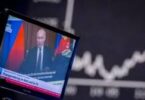Wilson Dizard
US President Donald Trump’s foreign policy does not follow conventional American diplomacy and it could get more erratic as elections appear around the corner. It was a long, bad week for US President Donald Trump. His attempt to extort money out of taxpayers for his border wall fell short, as airline employee labour unions threatening to strike appeared to scare Trump off a continuing government shutdown. The government is funded now for three weeks, while Congress debates border policy. So the shutdown is done for now, but it could come back.
Then, if that weren’t bad enough, Trump’s longtime associate and adviser Roger Stone, a Republican political operative and smear mongerer of Richard Nixon-era vintage, found himself in handcuffs on Saturday morning in his mansion in Ft. Lauderdale Florida. The arrest came as part of the almost two-year long probe by Special Counsel Robert Mueller, investigating Russian interference in the 2016 election. Stone was charged with seven felonies related to attempts to exploit the release of Russian-hacked Democratic National Committee emails to embarrass Hillary Clinton, all to help Trump win the presidency. In a bizarre coincidence, Trump decided this was the week to wade into Venezuela’s woes. He recognised opposition leader Juan Guiado as the country’s legitimate president. Nicolas Maduro, who still holds the deed to the oil-producing country, called Trump’s announcement an attempt at a coup.
Trump’s endorsement of Guiado came just after then 35-year-old Venezuelan claimed Maduro’s presidential title and announced himself, president. The American president grabbed the opportunity as fast as he could. On Monday night, the American National Security Adviser John Bolton, an armchair veteran of the Iraq War, and Steve Mnuchin, producer of the film Suicide Squad, announced new sanctions on Venezuela’s state-owned oil companies.
What consequences the US move will have remain to be seen, but the suffering of the Venezuelan people is nowhere near ending, with three million fleeing starvation and poverty in Venezuela to neighbouring countries Colombia and Brazil, which just elected far-right prime minister Jair Bolsonaro, not friend of refugees, like Trump (Bolsonaro’s government also swiftly recognized Guiado’s claim to Venezuela’s capital). For Trump, however, appearing to take a stand against Maduro, and making common cause with Florida Sen. Marco Rubio, could help him squeeze every last vote out of Florida.
The “Sunshine State” is home to many Republican-leaning Latin American exile communities that like to see any president take a tough line on Maduro. Or at least that seems to be what Trump is thinking, by turning Venezuela into a campaign issue in 2020. With 29 seats in the electoral college, Florida is a state Trump will absolutely need to win if he wants to be re-elected in 2020. With a brand new Trump-friendly Republican governor, Ron DeSantis, the president is also polling well in Florida, Politico reports. His numbers have declined in the upper midwest, where his trade war has thrown farmers off balance, and his promises to return manufacturing jobs haven’t come true. Meanwhile, Trump’s willingness to shutdown the government, harming both federal workers and imperilling the safety of aeroplane travellers, a headache for airlines, doesn’t endear him to anyone weak or powerful.
Trump understands that he won’t be able to get much through Congress, but he can still entertain himself by pushing the dials and levers on the US foreign policy apparatus without Nancy Pelosi’s permission. The biggest danger is that he’ll start a big war somehow, meddling with a world he doesn’t understand and refuses to learn. The likelihood of something catastrophic happening increases with virtually every foray onto the world stage that he makes.
If you want to understand why American foreign policy is so bizarre already, remember that it’s being conducted by a country in a state of low-level civil war over who’s human and how much. The first civil war concerned the humanity of people owned as property, just as nowadays our debates centre around the humanity of low-paid migrant labourers. The disagreement is still the same. Trump is the living, breathing embodiment of how twisted that uniquely American disagreement over who’s human can become.
But a country in the midst of a low-level civil war can’t be expected to have the most coherent foreign policy, but what’s remarkable is that Trump’s defies definition by any previous ideological thread in US relations with the rest of the world. Broadly, they’re internationalism, neoconservatism and isolationism. Each one of these ideologies assumes some level of trust or cooperation in international affairs. Internationalism trusts coalitions built along with the United Nations, such as the Iran nuclear deal; interventionism trusts coalitions outside of the UN, such as George W. Bush’s “coalition of the willing”; and isolationism trusts that the US and the rest of the world can somehow stay out of each other’s way.
Each ideology is subject to its own sort of “magical thinking” that proposes simple solutions to complex problems and imagines things can happen that absolutely won’t.
But Trump doesn’t hold to any of them. He sees interventionism and internationalism as just different brands of “globalism,” and calling him an isolationist sounds correct but ignores his lashing out at other countries for disrespecting him, starting trade wars and threatening North Korea with “fire and fury.” Trump doesn’t refer to ideology for solutions to problems but rather to his instinct, and his instinct is practically nihilistic.
It’s impossible to predict his behaviour based on anything you learned about American politics in school. Momentous decisions for Trump seem to come on impulse or may be guided by the immediate imperatives of the news cycle and the latest scandal. Trump thinks magically in news cycles, with volatile, disastrous results. The world can expect more of this in 2019, but be prepared for a drastic, potentially turbulent, transition of power in November 2020. Even when he isn’t president, he’ll still be tweeting.






